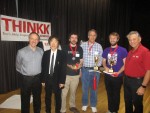Bigger Venue Sought After Success of Chappaqua KenKen Tourney

For the past six years the KenKen tournament run by Robert Fuhrer at the Chappaqua Public Library has been a can’t-miss event for local puzzle enthusiasts and numbers lovers.
Sunday’s renewal of the tournament, which was won for the third time by Martin Eiger of Montville, N.J., was also the last year it will be held in the library’s theater.
Fuhrer, a Chappaqua resident and founder and head of Nextoy, a Pleasantville-based company that specializes in developing innovative games and toys, isn’t leaving the library because he wants to but because he needs to. The explosion in popularity of KenKen, an arithmetic and logic puzzle using grids to arrive at the correct answer, and the tournament will require a larger venue, he said.
“There aren’t many (KenKen) tournaments. This is really it,” Fuhrer said. “There are student ones and some other ones, but it’s not really part of our regular offering. It needs to be but it’s a whole separate business. So it shows there’s a real hunger for it.”
Fuhrer said he had to cut off entries at 145 players, which was reached in less than 48 hours after registration opened in early November. About 110 players can be seated at tables in the library’s theater. He factored in that over the first five years, there was about a 20 percent no-show rate among registrants.
Discussions with New York Times crossword puzzle editor Will Shortz, who attended the tournament, are underway to see if next year’s event can be held at Shortz’s Westchester Table Tennis in Pleasantville.
Shortz said it’s a possibility, considering the facility comfortably accommodates the Pleasantville Crossword Puzzle Tournament in its 3,000-square-foot main meeting area.
“We have lots of space, lots of tables, terrific light,” he said. “We could do it.”
To highlight the popularity of the tournament, the two-and-a-half hour contest attracted not only local players, but contestants from Baltimore, Seattle and seven-year-old Lewis Reid from Grand Prairie, Tex.
Reid’s father, Robert, said his son’s teacher alerted them of the tournament because Lewis has shown proficiency at the game and enjoys the puzzles. However, they didn’t realize it was in New York. Since Lewis also was intrigued with seeing the city, they decided to make the trip for the weekend.
“For me, we came with no expectations except to experience it and see what it’s about,” Robert Reid said. “So we did it.”
Lewis got to try his hand at some tougher puzzles than he was accustomed to.
“Interesting, but harder than I thought,” he said.
The tournament also featured an appearance by KenKen inventor Tetsuya Miyamoto. Miyamoto opened his own mathematics academy in Yokohama, Japan in 1993, started puzzle classes two years later and found that it increased his students’ discipline by improving their ability to concentrate and think.
Miyamoto, who invented KenKen in 2004, also brought the game to impoverished students in Thailand and the children’s scholastic aptitude increased dramatically.
Now he runs mathematics classes in Tokyo and midtown Manhattan.
“KenKen has only one solution,” said Miyamoto, who worked with Fuhrer to import the game to the United States. “If there’s more than one solution, it’s a failure.”
Eiger, a software writer who finished the imposing 9-by-9 championship round grid in six minutes, 46 seconds, has finished in the top three in all five years he’s competed in the Chappaqua tournament. He enters several other puzzle tournaments each year, but this is his only math-based contest.
“I’ve been here five years and every year is fun and that’s what counts,” Eiger said.
Second-place finisher John Gilling, who finished in 8:08, is a KenKen fan who had learned about the tournament several years ago, but could never make the trip from Boston. The teacher-turned-data scientist, however, moved to Brooklyn in August and decided it was time to test his skills against 100 competitors.
“It’s a lot of fun, it keeps my brain sharp,” Gilling said of KenKen. “It keeps my commute interesting and it was really helpful in the classroom as well. Kids who don’t really like math, who don’t really have a good grasp on simple arithmetic can use this sort of tool to practice these things, get better and have fun and feel accomplished.”
Daniel Walkowitz, a professional bridge player from New York City, finished third taking 8:56 to complete the championship puzzle.
Fuhrer said he has been invited by the director of the Pacific Science Center in Seattle to hold a tournament there in March.
He marveled at young children sitting side by side with senior citizens, each competing in the same tournament.
“How many activities can a six-year-old and a 77-year-old do when one side is not tortured?” Fuhrer remarked. “This is one of them.”

Martin has more than 30 years experience covering local news in Westchester and Putnam counties, including a frequent focus on zoning and planning issues. He has been editor-in-chief of The Examiner since its inception in 2007. Read more from Martin’s editor-author bio here. Read Martin’s archived work here: https://www.theexaminernews.com/author/martin-wilbur2007/
